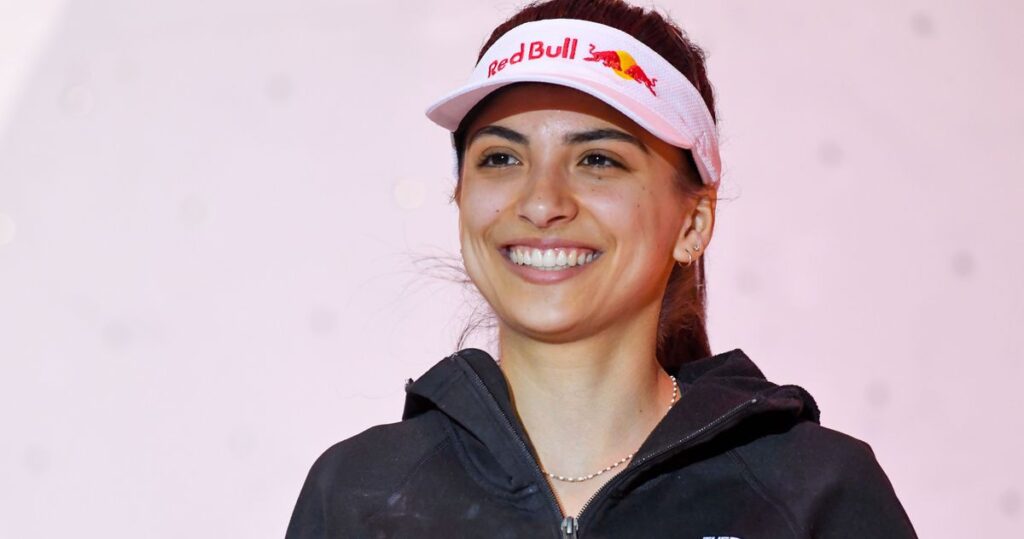
Photo: Spiess Foto Tirol / Erich Spiess/Red Bull Media House
When sport climbing makes its second appearance at the Olympics in Paris later this month, Natalia Grossman of the U.S. team will be the favorite to win the gold medal. In just a few seasons, the 23-year-old has become one of the most decorated climbers of all time. But Grossman is also just plain fun to watch. Like Spiderman, she soars over rock walls with her slender frame, seemingly hanging on by talons. Or she flashes a broad grin as she strategizes her way out of trouble during the sport's series of moves. After climbing from the ground, through a designated zone, and to the top of the wall, she looks back at the spectators below with infectious, unbridled joy.
The energy she brings to her sport has led her to adopt the motto “Smile and Fight.” “My coach came up with it because sometimes I get so in the zone that I forget that competition is not just about the result, but about celebrating the hard work that's been done,” Grossman says. She competes in bouldering, which involves climbing complex routes on a 15-meter wall without ropes, and lead, which involves using ropes to scale a 15-meter wall and is judged on the time and number of moves.
Grossman was originally a lively child who did gymnastics, but when she started climbing at age 6, she was hooked. She quickly showed talent for the sport, and at age 15, she moved with her family from California to Boulder, Colorado to further her climbing career. Now living in Salt Lake City, she doesn't take her path to climbing dominance for granted. She is keenly aware that the high entry fees keep the sport out of reach for many, and while she won't reveal details, she hints that her next steps will include projects to make climbing more accessible to more people. This desire to help others is especially on-brand. After leaving the bouldering walls, Grossman's goal is to become a psychologist, and she is training full-time while graduating from the University of Colorado in 2022.
The Cut recently spoke with Grossman to find out how the climber is preparing for the Olympics, what keeps her hooked on the sport, and what the future holds after the Paris Olympics.
You recently won your 10th World Cup gold medal in front of a home crowd in Salt Lake City. How are you feeling about that momentum heading into the Olympics?
Ahead of the first World Cup of the season, I was thinking about the Olympics: This is a new experience. Whatever happens, happens. I'm excited to be there. And the World Cup went really well, and I thought, But wait, maybe you can have goals, and they can be realistic. I just try not to put pressure on myself, have no expectations, and trust that I can be successful.
Bouldering, and sport climbing in general, is still a relatively new discipline in the Olympics. What should people who are unfamiliar with the sport understand?
Climbing, at least bouldering and lead, is unique in that you never know what's going to happen because you've never climbed the route beforehand. Looking back, this bouldering is something you're never seeing before. You have five minutes to figure it out and try to summit. It might be totally your style or it might be the opposite of your style. You just don't know. It's important to be open-minded and competent when you don't know what's going to happen. Because of the way points are awarded, you can summit every climb and still not win if you fall off. Or you can get halfway and still win. So I see it as competing with the climbs. You're competing with the climbers, not the actual competitors.
Climbing is as much a mental challenge as it is a physical challenge, and you've said that you're not necessarily the strongest climber. How do you train to overcome these mental demands?
I'm very interested in psychology. I think it's important to have people you can talk to – friends, family, coaches, physical therapists – a support team. I have a very strong relationship with my parents. But what I've really been working on for the last two years is to be in tune with myself and to feel and deal with my emotions and thoughts instead of just avoiding them. Because, yes, the risks may be high, but it's not healthy to pretend there are no risks. When I'm preparing to climb, I feel very anxious and I feel different for some reason, and I don't know why. I get very emotional. I try to feel it instead of trying to suppress it. My mother always tells me that it's okay to cry, that you have to let it out. When I injured my knee, I really wanted to be strong. And my mother told me, “It's okay, let it out. Nothing will change if you hold it in.” Once you understand what you're going through, you can move on.
When I watch your climbing videos, it sometimes looks as though you're hanging off the tip of one finger. How do you build that kind of strength, the right kind of calluses?
I always preach that less is more. There are people who train a lot more than I do. For me, it's really important to have time to not think about the gym. Before, I was climbing too much and training too much. Now I'm pushing it and Can I continue? If I can't, I stop. Sometimes it's really hard to stop, but it helps to have someone to say, “Okay, enough is enough.” Training depends on whether you're training bouldering or lead climbing. For bouldering, it's either hard climbing and movement practice, like strength training, or canvassing, where you climb without using your feet and only train your upper body. We also do hangboarding, where you hang by your fingers for a while. Lead, on the other hand, is an endurance sport, so training involves a lot of circuits.
Skin is also something that comes up a lot in our sport. If the skin is too dry it can crack and tear and it's very painful. I file my calluses down so they don't turn into flappy flaps. It's also not good for the skin to be too wet (as can being constantly sweaty). There are a variety of products available to address these issues – desiccants, moisturizers, etc.
What got you interested in sport climbing?
With gymnastics as a kid, you were doing it over and over again, trying to perfect something. When you got to a higher level, you'd do something new and repeat it for a year. Whereas with climbing, you can go to the gym and create new moves, do new training. There's a lot more variety. And when you come out on top at the last moment, usually in a competition, it feels really good. I got through it, I was able to stay focused, stay mentally prepared, execute and perform..
You’re competing against a small group of elite women who have often been competing from a very young age – is it a friendly relationship between you guys or do you have to isolate from each other because of the mental strain?
I love training with my rivals and other strong women, but not everyone wants to do that. It was hard to find people who feel the same way as me. If you think about the World Cup roster, there are probably about 60 female athletes competing. Of those, only one lives less than an hour away from me. So I'm not with my rivals very often. They're based in Innsbruck, Austria, and a lot of professional climbers go there for training. I went there earlier this year and it was a lot of fun climbing with girls who were very open and excited to work together. I loved hanging out with them, walking around the city, eating meals, climbing together because I think we can lift each other up and push the level of our sport.
Bouldering is not an easy sport to get into, what advice would you give to people looking to get started? And what do you think the future holds for the sport?
Day passes to climbing gyms are getting more and more expensive. I have the funds, but how can someone without funds get into the sport? I don't think there is one answer or solution. I have a fun project coming up in the fall, but USA Climbing isn't doing anything about it right now. I have access to the US Training Center, but it's not open to the public. I also have access to the local climbing gyms where I live, but they're not affiliated with the federation. It would be great if there were programs across the major gym chains to support budding climbers.
Will you continue climbing and competing after Paris? What are your plans for the future?
I definitely want to go back to school. A bachelor's degree in psychology doesn't do much for you. Lately, I've been thinking about going into sports psychology. I don't know when I'll take that step, but I'll take it eventually. For now, I'm just focusing on climbing and seeing where it takes me. I feel like a lot of women retire earlier, but most of us survive until about 30 or 32 if we're really motivated. I have plenty of time. Hopefully, I have a few more Olympic cycles. But it's not just about the titles. I'll keep fighting with a smile on my face.

